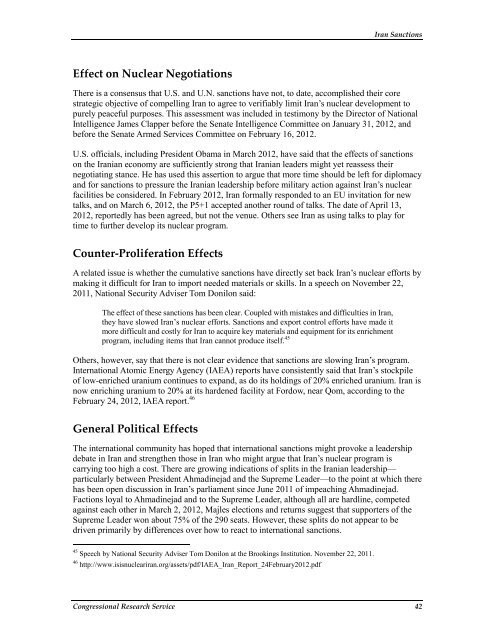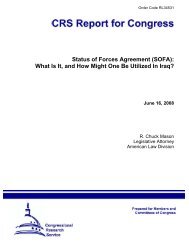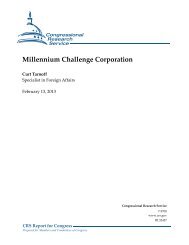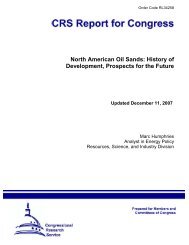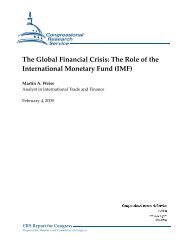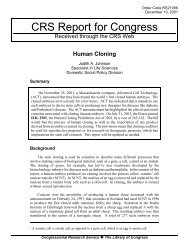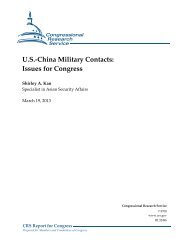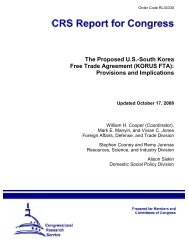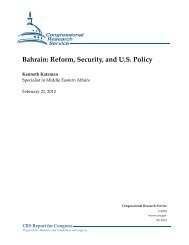Iran Sanctions - Foreign Press Centers
Iran Sanctions - Foreign Press Centers
Iran Sanctions - Foreign Press Centers
You also want an ePaper? Increase the reach of your titles
YUMPU automatically turns print PDFs into web optimized ePapers that Google loves.
Effect on Nuclear Negotiations<br />
<strong>Iran</strong> <strong>Sanctions</strong><br />
There is a consensus that U.S. and U.N. sanctions have not, to date, accomplished their core<br />
strategic objective of compelling <strong>Iran</strong> to agree to verifiably limit <strong>Iran</strong>’s nuclear development to<br />
purely peaceful purposes. This assessment was included in testimony by the Director of National<br />
Intelligence James Clapper before the Senate Intelligence Committee on January 31, 2012, and<br />
before the Senate Armed Services Committee on February 16, 2012.<br />
U.S. officials, including President Obama in March 2012, have said that the effects of sanctions<br />
on the <strong>Iran</strong>ian economy are sufficiently strong that <strong>Iran</strong>ian leaders might yet reassess their<br />
negotiating stance. He has used this assertion to argue that more time should be left for diplomacy<br />
and for sanctions to pressure the <strong>Iran</strong>ian leadership before military action against <strong>Iran</strong>’s nuclear<br />
facilities be considered. In February 2012, <strong>Iran</strong> formally responded to an EU invitation for new<br />
talks, and on March 6, 2012, the P5+1 accepted another round of talks. The date of April 13,<br />
2012, reportedly has been agreed, but not the venue. Others see <strong>Iran</strong> as using talks to play for<br />
time to further develop its nuclear program.<br />
Counter-Proliferation Effects<br />
A related issue is whether the cumulative sanctions have directly set back <strong>Iran</strong>’s nuclear efforts by<br />
making it difficult for <strong>Iran</strong> to import needed materials or skills. In a speech on November 22,<br />
2011, National Security Adviser Tom Donilon said:<br />
The effect of these sanctions has been clear. Coupled with mistakes and difficulties in <strong>Iran</strong>,<br />
they have slowed <strong>Iran</strong>’s nuclear efforts. <strong>Sanctions</strong> and export control efforts have made it<br />
more difficult and costly for <strong>Iran</strong> to acquire key materials and equipment for its enrichment<br />
program, including items that <strong>Iran</strong> cannot produce itself. 45<br />
Others, however, say that there is not clear evidence that sanctions are slowing <strong>Iran</strong>’s program.<br />
International Atomic Energy Agency (IAEA) reports have consistently said that <strong>Iran</strong>’s stockpile<br />
of low-enriched uranium continues to expand, as do its holdings of 20% enriched uranium. <strong>Iran</strong> is<br />
now enriching uranium to 20% at its hardened facility at Fordow, near Qom, according to the<br />
February 24, 2012, IAEA report. 46<br />
General Political Effects<br />
The international community has hoped that international sanctions might provoke a leadership<br />
debate in <strong>Iran</strong> and strengthen those in <strong>Iran</strong> who might argue that <strong>Iran</strong>’s nuclear program is<br />
carrying too high a cost. There are growing indications of splits in the <strong>Iran</strong>ian leadership—<br />
particularly between President Ahmadinejad and the Supreme Leader—to the point at which there<br />
has been open discussion in <strong>Iran</strong>’s parliament since June 2011 of impeaching Ahmadinejad.<br />
Factions loyal to Ahmadinejad and to the Supreme Leader, although all are hardline, competed<br />
against each other in March 2, 2012, Majles elections and returns suggest that supporters of the<br />
Supreme Leader won about 75% of the 290 seats. However, these splits do not appear to be<br />
driven primarily by differences over how to react to international sanctions.<br />
45 Speech by National Security Adviser Tom Donilon at the Brookings Institution. November 22, 2011.<br />
46 http://www.isisnucleariran.org/assets/pdf/IAEA_<strong>Iran</strong>_Report_24February2012.pdf<br />
Congressional Research Service 42


